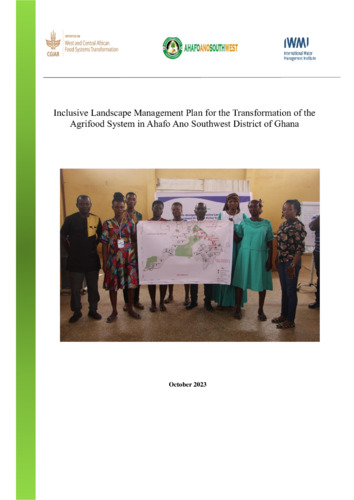Inclusive landscape management plan for the transformation of agrifood systems in Ahafo Ano Southwest District of Ghana
Abstract
Inclusive landscape management (ILM) is a holistic approach to managing landscapes that considers the needs of all stakeholders, including local communities, indigenous peoples, and marginalized groups. This Inclusive Landscape Management Plan (ILMP) seeks to provide a framework for the sustainable management and development of landscapes in the Ahafo Ano Southwest District (AASWD) of Ghana. The ILMP is designed to address the increasing pressure on landscapes in West and Central Africa under TAFS-WCA initiative (from deforestation, land degradation, poor water management, unsustainable mining, wildlife poaching, and climate change). The ILMP emphasizes the integration of social and ecological systems, local participation, and sustainable resource use and management within landscapes. It is a response to ‘top-down’ approaches to sustainable development, in which power and decision-making are in the hands of external development professionals. Instead, the ILMP is based on shared ownership of decision-making and the full participation of all stakeholders.
This ILMP is a product of a collaborative effort between the International Water Management Institute (IWMI), the AASWD, and local stakeholders from the Mankran micro-watershed of Ghana. The ILMP was developed through a participatory process that involved stakeholders from all sectors, including government, civil society, and the private sector. The process began with the creation of a narrative that served as a broad objective for promoting inclusive landscape management in the Mankran microwatershed. The research team then worked with local stakeholders to assess the current state of the landscape and identify key challenges and opportunities. Based on the assessment, the research team and stakeholders co-developed a set of management strategies and interventions that are designed to address the key challenges and achieve the desired outcomes. The ILMP was designed with a shared vision for the landscape: “To sustainably co-harness landscape resources in a transparent and accountable manner to engender resilient communities and healthy ecosystems in the Ahafo Ano Southwest District. Based on the vision and identified challenges, stakeholders proposed various response strategies that included: Increased irrigation efficiency through adaptive and inclusive management; mechanisms to reduce postharvest losses; mechanism for profit or benefit sharing from mining and forestry; Enhanced gender and youth involvement in decision-making; Improved income and livelihood diversification opportunities; Improved adoption of sustainable land/forest/water management practices; Increased food safety through reduced contamination from pesticides and galamsey (illegal small-scale mining) the strengthening of local/traditional institutions for natural resources management. The ILMP also includes a monitoring and evaluation framework to track progress and ensure that the interventions are having the desired impact. It is critical to note that the ILMP is a living document that should be updated on a regular basis to reflect changes in the landscape and the needs of the stakeholders. It is hoped that the ILMP would serve as a blueprint for sustainable and inclusive landscape management in the AASWD and beyond.

